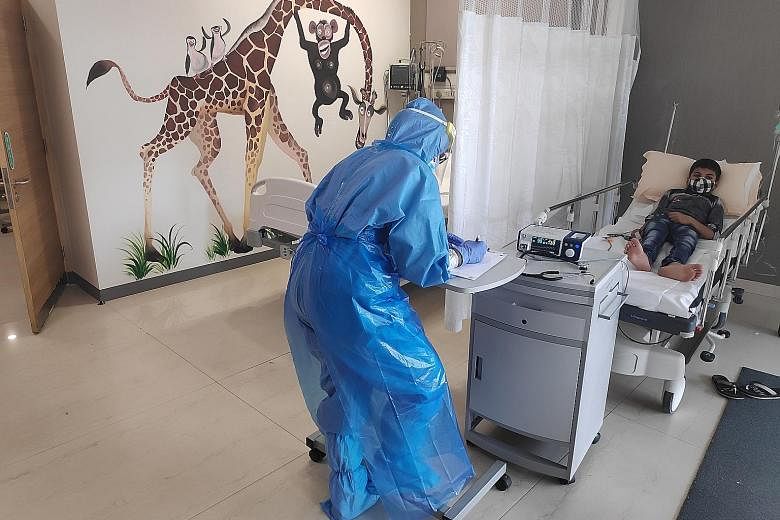Nine-year-old Malhaar Inimai "was not happy" when he woke up with a mild fever at 3.30am last weekend.
"I knew it was a Covid symptom," the fourth grader in Bangalore said. The next morning, he woke up to the "bad news" that he and his grandmother, 67, had tested positive for the coronavirus.
"For the first three days, I felt dizzy and I just wanted to collapse. After three days, I was okay," said Malhaar.
He described his home isolation: He was to stay within two rooms, wear an N95 mask when someone was around and not touch his parents. If he felt feverish or breathless, he had to inform an adult.
Doctors, parents and officials across India say more children are getting Covid-19 and need medical intervention in the devastating second wave of the pandemic than in the first wave last year.
"The reasons for more infections could be lax behaviour, more transmissible strains or more awareness about testing. But a noticeable medical difference in the second wave is that infected children are more symptomatic than they were last year," said Dr Digant Shastri, former president of the Indian Academy of Paediatrics.
There is no national figure on how many under 19 are infected, but recent government data drawn from around 10,000 patients in hospitals showed that the proportion aged between zero and 19 had gone up from 4.2 per cent in the first wave to 5.8 per cent in the second.
As approved vaccines in India have not been cleared for those under 18, the only protection for them is masks and social distancing.
"Last Covid season, we saw one child a week with Covid. Now we're seeing an average of 10 children a day, from infants to adolescents. Most are symptomatic - they may not get very unwell but need medical intervention," said Dr Srikanta J.T, paediatric pulmonologist at Aster RV Hospital in Bangalore.
In the 26 days since April 1, his department's outpatient ward has seen about 300 infected children and 60 were admitted, 10 of whom needed critical care.
Moderately symptomatic patients have severe cough, breathlessness, low oxygen saturation levels and inflammation in the lungs.
"Such patients need hospitalisation. Unlike in adult Covid patients, we can't use drugs and steroids not tested on children like ivermectin. We use intravenous steroids with antiviral judiciously for some children under 12, and for those over 12, we use steroids and remdesivir and, if required, tociluzimab," said Dr Srikanta. "The infectivity is higher, but mortality among children is still low."
Mrs Pratibha H.B, a psychology professor, is isolated in a critical care room in Aster CMI Hospital with her seven-year-old daughter who not only had Covid-19 but also a kidney infection. Mrs Pratibha does not have Covid-19 but had signed a consent form accepting the risks of staying with her daughter.
"I wear a mask all the time and keep a distance. But... when they change some of the tubes, it hurts her a lot, so I hold her hand. When she's lying sick, I can't think of myself," said Mrs Pratibha. Her older daughter, 11, has also tested positive, and is staying with her aunt.
Most children, however, have mild symptoms like fever, sore throat, cough and diarrhoea.
"The good news is that 99 per cent of the infected children need only home care, with healthy food, warm water, cough syrup and paracetamol for fever," said Mrs Geethamani H.B, nurse in charge of the children's intensive care unit at Aster CMI.
But as India sees over 370,000 new infections a day, hospitals are finding entire families testing positive, making isolation and medical care more complicated logistically. Infected parents have to find caregivers for their healthy children. Healthy parents have to be isolated from their infected children. One child may be sick and the other healthy, and there may not be enough rooms in the house for isolation.

